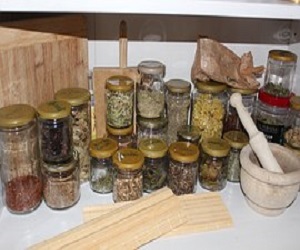


Bridging Tradition And Science

In a world increasingly dominated by pharmaceuticals and synthetic medicines, the age-old wisdom of herbal knowledge continues to find relevance in contemporary healthcare. Modern science is unveiling the potent therapeutic potential of herbs and botanicals, demonstrating that traditional herbal remedies have a well-deserved place in our quest for well-being. In this article, we'll explore the modern applications of herbal knowledge and how it bridges the gap between tradition and science.
The Resurgence Of Herbal Medicine
Herbal medicine, also known as phytotherapy, has experienced a resurgence in recent years. People are turning to herbal remedies for various reasons, including a desire for natural, sustainable healthcare options, concerns about the side effects of synthetic drugs, and a growing interest in holistic health practices.
Evidenced-Based Herbal Medicine
One of the most significant developments in modern herbal knowledge is the growing body of scientific evidence supporting the efficacy and safety of herbal remedies. Researchers are conducting clinical trials and studies to investigate the therapeutic properties of specific herbs, validating many traditional uses. For instance, herbs like St. John's Wort have demonstrated their effectiveness in treating mild to moderate depression.
Herbs In Complementary Medicine
Modern healthcare is increasingly embracing the concept of complementary medicine, where herbal knowledge is integrated into conventional treatments. Many healthcare practitioners recommend herbal supplements alongside conventional medications to enhance treatment outcomes and minimize side effects.
Holistic Health And Herbal Medicine
Herbal knowledge aligns well with the principles of holistic health. It recognizes the interconnectedness of physical, emotional, and mental well-being. Herbal remedies are often employed to address not only physical symptoms but also the root causes of ailments, which can include stress, poor diet, or emotional imbalances.
Herbs For Chronic Conditions
Herbal medicine is gaining recognition for its role in managing chronic conditions. Conditions like diabetes, hypertension, and arthritis can often be improved with the use of specific herbs. For instance, cinnamon has shown promise in helping regulate blood sugar levels in individuals with diabetes.
Natural Remedies For Mental Health
Herbs are increasingly used in the management of mental health conditions. Plants like lavender, chamomile, and valerian are valued for their calming and anxiety-reducing effects. They offer a gentler alternative to pharmaceuticals for individuals seeking natural solutions to anxiety, stress, and depression.
Safety And Regulation
As herbal remedies become more popular, it's essential to address safety and regulation. Many countries have regulatory agencies that oversee the production and sale of herbal supplements, ensuring quality and safety. Additionally, consulting with a qualified herbalist or healthcare practitioner is crucial to avoid potential interactions with medications and ensure proper dosing.
The modern applications of herbal knowledge demonstrate a fusion of ancient wisdom with scientific rigor. Herbal medicine, once relegated to the realm of folklore, has found its place in contemporary healthcare as a complementary and sometimes primary approach to health and well-being. As science continues to unveil the therapeutic potential of herbs, herbal knowledge is bridging the gap between tradition and modern medicine, offering a holistic and natural path to better health.
Nurturing Well-Being With Nature's Fragrances
 The Essence Of Aromatherapy
The Essence Of Aromatherapy
Aromatherapy, with its roots dating back to ancient civilizations, is founded on the principle that our sense of smell is intrinsically connected to the brain's limbic system, which governs our emotions, memory, and mood. Essential oils, extracted from various parts of plants, are rich in aromatic compounds that can influence our psychological and physiological states.
Physical Balance
Aromatherapy can promote physical balance through essential oils that alleviate discomfort and encourage relaxation. Oils like lavender, chamomile, and eucalyptus are known for their soothing properties. Lavender, for instance, can reduce stress, improve sleep quality, and ease muscle tension. Incorporating these oils into massages or baths can significantly impact our physical well-being.
Emotional Harmony
Our emotional well-being is closely linked to our overall balance in life. Aromatherapy can help restore emotional equilibrium by reducing anxiety, uplifting the spirits, and fostering emotional balance. Essential oils like citrus, rose, and ylang-ylang have mood-enhancing properties. Diffusing these oils in our living spaces or incorporating them into self-care rituals can create a more positive emotional environment.
Mental Clarity
Mental balance is equally important for a balanced life. Aromatherapy can enhance mental clarity, reduce stress, and improve focus. Oils like peppermint and rosemary are well-known for their cognitive-enhancing properties. Diffusing these oils in workspaces or using them during meditation practices can create an environment conducive to a balanced and focused mind.
Holistic Approach To Balance
Aromatherapy is a holistic approach to achieving balance. It recognizes the interconnectedness of physical, emotional, and mental well-being and offers a versatile and natural means to address these interconnected aspects of our lives.
Simplify Your Culinary Journey
 The Benefits Of Easy Cooking
The Benefits Of Easy Cooking
Time-Saving: Easy cooking methods typically save time, making them ideal for busy individuals or families. You can whip up a delicious meal in a short amount of time.
Cost-Effective: Many easy cooking techniques use affordable ingredients and require fewer kitchen gadgets. This can lead to cost savings in your grocery bill and reduce the need for specialized equipment.
Reduced Stress: Cooking shouldn't be a source of stress. Easy cooking emphasizes simplicity and minimizes the complexity of meal preparation, resulting in a more relaxed experience.
Healthy Choices: You can create nutritious and balanced meals using easy cooking methods. By choosing fresh and whole ingredients, you'll be more likely to make health-conscious choices.
Tips For Easy Cooking
Plan Your Meals: Start by planning your meals in advance. Create a weekly menu, so you know exactly what you'll be cooking each day. This can save you from last-minute meal dilemmas.
Embrace One-Pot Dishes: One-pot meals are a fantastic way to minimize cleanup and streamline cooking. Dishes like soups, stews, and pasta make meal preparation quick and easy.
Sheet Pan Dinners: Sheet pan meals involve cooking an entire meal on a single sheet pan in the oven. You can roast vegetables and proteins together for a flavorful, fuss-free dinner.
Elevate Your Culinary Skills In The Kitchen
 3. Master Basic Knife Skills
3. Master Basic Knife Skills
Knowing how to properly handle a knife is as important as having a sharp one. Learn essential knife skills like the claw grip to protect your fingers, and practice techniques like chopping, mincing, and julienning for precision in your cuts.
4. Control Your Heat
Understanding temperature control is crucial in cooking. Learn the difference between simmering, boiling, sautéing, and searing. Adjusting the heat appropriately can prevent overcooking, burning, or undercooking your dishes.
5. Taste As You Go
Taste your food as you cook. This allows you to adjust seasoning and flavors along the way. Don't be afraid to add more salt, pepper, or other seasonings if necessary. A balanced and well-seasoned dish is the hallmark of a great cook.
6. Keep Your Workspace Organized
A cluttered kitchen can lead to confusion and accidents. Keep your workspace tidy by cleaning as you go and returning items to their proper places when you're done with them. An organized kitchen will help you stay focused and efficient.
7. Get To Know Your Ingredients
Understanding your ingredients is crucial to successful cooking. Know the flavor profiles of herbs and spices, and learn how different ingredients interact with each other. This knowledge will allow you to create more harmonious and well-balanced dishes.
8. Use Fresh Ingredients
Whenever possible, use fresh ingredients. Fresh produce, meats, and dairy can make a significant difference in the taste and quality of your dishes. Seasonal and local ingredients can be especially flavorful.
9. Experiment And Learn
Don't be afraid to experiment in the kitchen. Try new recipes, techniques, and ingredients. Mistakes are part of the learning process, and they often lead to unexpected discoveries.






The Key To A Balanced Diet And Healthy Eating
 Understanding Portion Control
Understanding Portion Control
Portion control involves being mindful of the quantity of food you eat during a meal or snack. It's not about depriving yourself but rather about ensuring that you consume a suitable amount of nutrients while avoiding excessive caloric intake. Proper portion control helps you better manage your caloric intake, which is crucial for weight management and overall health.
The Importance Of Portion Control
Weight Management: One of the primary benefits of portion control is its role in weight management. Consuming smaller, balanced portions can help prevent overeating, which is often a significant contributor to weight gain and obesity.
Balanced Nutrition: Portion control encourages a balanced intake of nutrients. It ensures that you get a variety of foods in appropriate amounts, which is essential for overall health and well-being.
Digestive Health: Eating moderate portions can alleviate digestive discomfort and prevent issues like indigestion, bloating, and heartburn.
Blood Sugar Control: Portion control can help stabilize blood sugar levels, making it a valuable strategy for individuals with diabetes or those at risk of developing the condition.
Mindful Eating: It encourages mindful eating, a practice that promotes greater awareness of hunger and fullness cues, reducing the likelihood of emotional or overindulgent eating.
Practical Portion Control Strategies
Use Measuring Tools: Utilize measuring cups, kitchen scales, and portion control plates to accurately measure your food servings.
 Mindfulness Meditation: One of the most effective ways to find tranquility is through mindfulness meditation. This ancient practice encourages individuals to be fully present in the moment, without judgment. By focusing on their breath and observing their thoughts and emotions, people can achieve a state of calm and serenity. Even just a few minutes of mindfulness meditation each day can provide a sense of tranquility and a break from the daily hustle.
Mindfulness Meditation: One of the most effective ways to find tranquility is through mindfulness meditation. This ancient practice encourages individuals to be fully present in the moment, without judgment. By focusing on their breath and observing their thoughts and emotions, people can achieve a state of calm and serenity. Even just a few minutes of mindfulness meditation each day can provide a sense of tranquility and a break from the daily hustle.
Nature Retreats: Nature has a remarkable ability to soothe the mind and replenish the soul. Taking a break from the stress-filled world to spend time in nature can be a profound source of tranquility. Whether it's a walk in the woods, a day at the beach, or simply sitting in a park, connecting with nature can offer a sense of peace that is hard to find elsewhere.
Digital Detox: The constant connectivity to technology can be a significant source of stress. Taking time for a digital detox, where you disconnect from your devices and immerse yourself in the offline world, can be a refreshing way to find tranquility. It allows you to be fully present in your surroundings and engage in meaningful, real-world interactions.
Simplicity And Minimalism: Sometimes, simplifying your life and embracing minimalism can lead to tranquility. Reducing clutter in your physical space and streamlining your commitments can create a sense of calm. It allows you to focus on what truly matters, eliminating unnecessary stressors.
Yoga And Breathwork: Yoga combines physical movement with breath control, promoting relaxation and inner peace. It not only improves physical flexibility but also calms the mind. Incorporating yoga and breathwork into your routine can help you find tranquility in the midst of chaos.
Art And Creativity: Engaging in creative activities such as art, writing, or music can be therapeutic. These activities offer an escape from the stress-filled world, allowing you to express your emotions and find tranquility through creative self-expression.